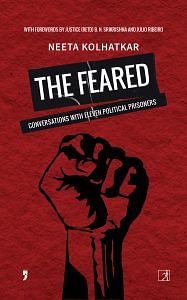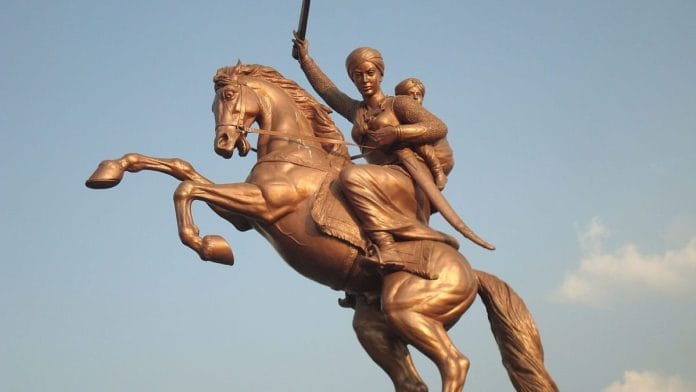Neeta Kolhatkar: You have been arrested a few times under draconian laws like Sedition and the National Security Act (NSA). Could you go back to the time in August 2018, when you were first arrested? Was this the case when you had uploaded a video regarding your views on observing a valour day for Rani of Jhansi?
Kishorechandra Wangkhem: The point is that we have no negative feelings about her, but you need to understand that her reference has no place in our culture. I respect her valour and her involvement in the 1857 movement, but with due respect, Manipur was not even a part of India in 1857. Manipur was a princely state. There is nothing wrong with observing something in one’s personal life, but this sort of official observance will impact our younger generation negatively.
My point is that the Rani of Jhansi has more significance in Madhya Pradesh, Uttar Pradesh, and some other states of mainstream India. It is pointless trying to force it on us because it has no significance in our local history or tradition. I uploaded the video with these same comments on November 19, 2018. On November 20, I was picked up from the residence of my legal counsel.
In fact, I had gone to meet him to discuss the legal options I had since there was already an arrest warrant issued against me. We were planning to surrender before the magistrate, but somehow the police got a whiff of our plans, and they landed there to arrest me. I was remanded in police custody for six days. Later, I was produced before the chief judicial magistrate, the same one who had previously dealt with my case.
This time, he somehow managed to give me bail and did not send me to jail. His observation was that the opinions expressed in the video were of an individual against a public leader and in street language because I had used the ‘F’ word. I returned home on November 26, as I was granted bail, but I don’t know what transpired between the officials of our state government and the CM.
The very next day, police were back at my doorstep, around 12.30pm, just as I was preparing to have lunch. Some policemen in plain clothes came and led me to a car, in which I was driven to the police station. I was made to sit in the office of the additional SP for nearly six hours without any officer speaking with me. My family waited outside for me, as they wanted to know what the authorities were planning to do with me. The police made it seem as though they were chatting with me, but I was forced to sit alone.
Also read: Sitting on world records to begging for the benefit match—how Syed Kirmani was stumped out
Around 6.30pm, a police officer came with a sheet of paper and asked me to sign it. I refused, so he just went away with the paper, and then around 7pm, I was asked to go and sit in the backseat of a gypsy parked in the compound. Obviously, I had no clue where they were taking me. I wasn’t blindfolded but I could not see anything outside, since it was dark.
Once we reached the spot, I saw the central prison complex of Manipur, and I immediately knew I was going to be jailed. They had completed all the formalities in the SP’s office. Now here is how they thought they would surprise me. Just as I stepped out, they handed me a paper that showed I was being booked for a breach of the National Security Act (NSA). Till then, I had no clue about their plans. (Laughs).
At that time, the deputy superintendent informed me that, under these charges, I would be in jail for one year without being allowed any sanction to apply for bail. That is when I was first shocked, and I just allowed this news to sink in. After that, I spent precisely 140 days in jail.
NK: Did you receive any support from the media fraternity or other sections of society at this time?
KW: Yes, the media fraternity supported me at that time, and they lodged a protest. Many journalists came out on the third day of protests, and I was granted bail on medical grounds. That was also done in a hurried manner because the CM had directly intervened, and I was eventually released around August 10.
Later, a few journalists did tell me that this was the first time they had supported me, but if I kept up with such rants, I could not count on similar support in the future because they were under pressure. I got what they were saying because they had to face their editors and management, and the government could target them too.
NK: The second case against you is very important. Again, you uploaded a video on social media, showing how the ethnic Manipuri community was being forced to fall in line with majoritarian religious views. Can you tell us about this case? Did you anticipate the severe charges, like sedition?
KW: The second case was in November 2018, when the state government forced us to observe the birthday of Rani Lakshmi Bai of Jhansi. This programme was organised by the ruling party (the Bharatiya Janata Party), and our CM inaugurated it.
I was editing this news, and I wasn’t happy seeing the live videos; they upset me. I posted a video on my social media account because I wanted mainstream India to understand that in Manipur and the surrounding north-eastern states, we had our own indigenous language, culture, traditions, and beliefs, all of which were assimilated into mainstream Hinduism over a period of time.
In the last few years, there has been a momentum to revive our indigenous culture and traditions. Many people in Manipur took to social media platforms to oppose this move to celebrate Martyrs’ Day in their state.

This excerpt from ‘The Feared: Conversations with Eleven Political Prisoners’ by Neeta Kolhatkar has been published with permission from Simon & Schuster India.







People like Kishorechandra Wangkhembare are there in every society. They are just rabble rousers and revels without a cause. All they want is to create mischief and disturbance. Chaos is what they revel in.